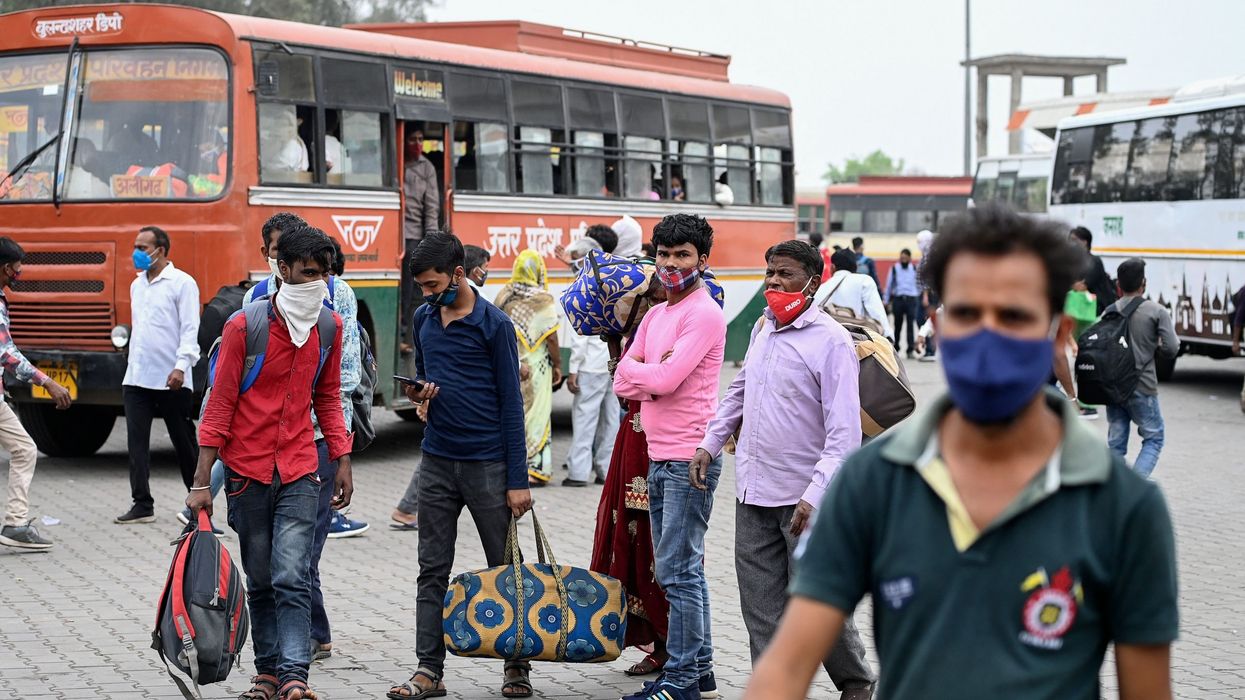Amid India's COVID-19 crisis, migrant workers are abandoning cities and heading for their villages in droves in a repeat of last year's exodus when the lockdown shut industries and left them jobless - but this time they are worried about safety.
India's toll from the coronavirus surged past 200,000 on Wednesday with nearly 18 million people infected, according to government data, with the cities of Delhi, Mumbai, Pune, Surat and Bangalore under lockdown.
Healthcare facilities have been overwhelmed, with hospitals over-run and shortages of oxygen, medical supplies and hospital staff.
"I was reading about all the cases and the deaths and getting worried. I still had work but I didn't want to stay in the city," said Sanjit Kumar, 30, who left Surat in western India last week on a train for his village in eastern Bihar.
"Last year I had gone back on a truck. But this time, I didn't want to wait for a complete lockdown. I was getting scared looking at messages of deaths on WhatsApp," he told the Thomson Reuters Foundation by phone from his village.
"Life is precious for everyone."
India's strict lockdown measures last year, such as severing transport links, took a toll on the nation's estimated 100 million migrant workers, triggering an exodus from cities where they worked in garment factories, building sites and brick kilns.
Hundreds died in road accidents while walking, cycling and travelling in trucks and vans in intense heat, charities said.
As the second wave of COVID-19 started sweeping through India last month, migrants who had returned to work after months of staying jobless again began a hasty retreat, fearing transport services could again get suspended.
At least three migrant workers died when an overcrowded bus from Delhi overturned in central India, local media reported.
But officials and campaigners said the impact of the lockdown this year was not as severe as in 2020 because industries had not been shut entirely and trains remained operational.
The government this month revived migrant worker helplines that were set up last April and announced financial assistance for employers who hire those who lost work in the pandemic.
"The volume of incoming calls on our helplines is not as much as last year. We have also told employers to hold on to workers," said D.P.S. Negi, India's Chief Labour Commissioner.
"There is not as much panic in the minds of people since transport services are not shut. The government is more prepared this time than last year."
THE PANDEMIC
Until a few weeks ago, migrant rights non-profit Gram Vikas in eastern Odisha state had linked workers with jobs in Kerala and arranged transport for them but that has stopped.
Many of them have now booked tickets to return to their villages as infections at workplaces have spiked and many fear contracting the infection, the charity's officials said.
"We are shifting gears to save lives now. We will use our resources to bring them back and quarantine. We are not motivating them to stay back in cities any more," said Liby Johnson, executive director, Gram Vikas.
"We are getting into a more difficult situation ... It is no longer the fallout of COVID like the lockdown last year. This time it is COVID itself, it is the pandemic causing problems. Personal safety and life are key issues now," he said.
Migrant worker helplines that were muted for a few months have begun ringing again, with workers seeking help for tickets on overbooked trains, or assurance of safety.
"They want to know where the odds of them getting good healthcare are better," said Johnson Topno, a team leader of the state migrant control room in eastern Jharkhand state.
"They are worried where they would be safer - in cities or their villages. They want guarantees, but like always there are none as far as they are concerned," he said.




